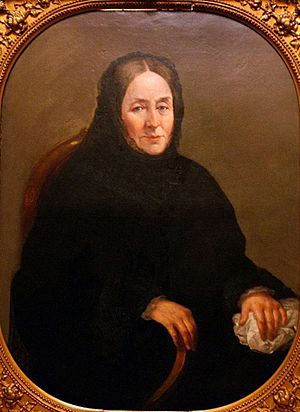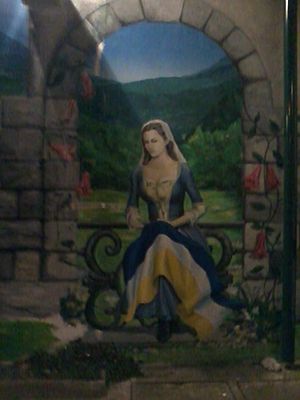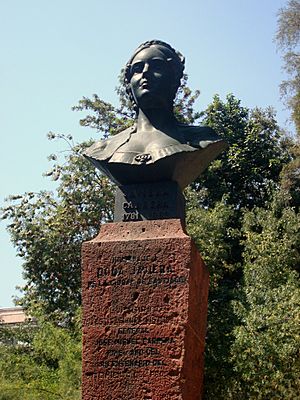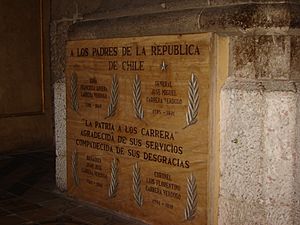Javiera Carrera facts for kids
Quick facts for kids
Javiera Carrera
|
|
|---|---|
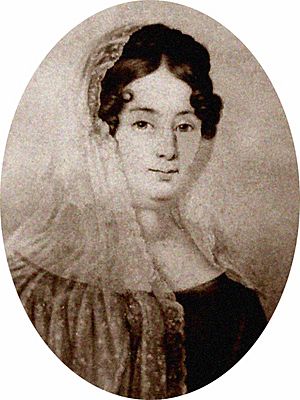 |
|
| Born | March 1, 1781 |
| Died | August 20, 1862 (aged 81) |
Javiera Carrera (born March 1, 1781 – died August 20, 1862) was a very important person in Chile's fight for freedom. She was known for her strong spirit and for helping her brothers, José Miguel, Juan José, and Luis. They were all key figures during the early part of Chile's independence movement, a time called the Patria Vieja (meaning "Old Republic"). Many people say she sewed the very first national flag of Chile. Because of her efforts, she is often called the "Mother of Chile."
Javiera came from the wealthy Carrera family, who had roots in the Basque region. This family played a big part in the Chilean War of Independence.
Contents
Javiera's Life Story
Javiera was born in Santiago. She was the oldest child of Ignacio de la Carrera y Cuevas and Francisca de Paula Verdugo. From a young age, people noticed her beauty and her strong personality.
She got married when she was young, on May 2, 1796, to Manuel de la Lastra y de la Sotta. They had two children, Manuel and Dolores. Manuel died in 1798.
In 1800, she married again, this time to a Spanish nobleman named Pedro Díaz de Valdés. They had five children together: Pedro, Domitila, Pío, Santos, and Ignacio.
Supporting Independence
During the time of the Patria Vieja (the "Old Republic"), Javiera became a huge supporter of her family's goal: to make Chile an independent country. She helped organize and support many groups that worked to help the new government. It was during this time, in 1812, that she sewed the first Chilean flag. Her many activities made her a well-known hero of these early struggles for freedom.
Life in Exile
After Spain took control of Chile again in 1814, Javiera had to leave her home. She went into exile with her brothers in Argentina. She first lived in Mendoza and later moved to Buenos Aires.
While in exile, she faced many challenges, including health problems. She also received very sad news. Her brothers Juan José and Luis were executed in 1818. Later, José Miguel was also executed in 1821.
Javiera did not return to Chile until 1824. This was one year after Bernardo O'Higgins resigned and left Chile. Javiera believed O'Higgins was responsible for her brothers' deaths.
Returning Home
Once back in Chile, Javiera worked hard to bring her brothers' bodies home. They had been buried in Mendoza. President Francisco Antonio Pinto helped her do this in 1828.
Javiera spent the rest of her life quietly at her farm in El Monte. She passed away there in August 1862.
Her Last Years
Javiera lived a quiet life on her estate in El Monte until her final days. She focused on her home and helping others. A big moment for her was when her brothers' bodies were brought back to Chile in 1828. This happened during the time Francisco Antonio Pinto was president.
She died at her farm near Santiago on August 20, 1862. Since 1952, her body has been buried with her brothers in the Santiago Metropolitan Cathedral.
Javiera's Legacy
Javiera Carrera is seen as a powerful symbol of Chilean women who stood up for what they believed in. She is often compared to other strong women in history like Paula Jaraquemada and Inés Suárez. Even today, she is remembered as a role model for people who protest against unfair treatment.
One of the most respected public schools for girls in Santiago, Chile is named after her. It is called the Liceo A-1 Javiera Carrera. A very famous student from this school was Michelle Bachelet, who later became the president of Chile.
Many writers in the 1800s admired Javiera Carrera. People like Maria Graham, Miguel Luis Amunátegui, Vicente Grez, and Benjamín Vicuña Mackenna wrote about her. They highlighted her love for her country and how she defended her brothers. They described her as a strong, determined, and smart woman.
See also
 In Spanish: Javiera Carrera para niños
In Spanish: Javiera Carrera para niños
 | Laphonza Butler |
 | Daisy Bates |
 | Elizabeth Piper Ensley |


